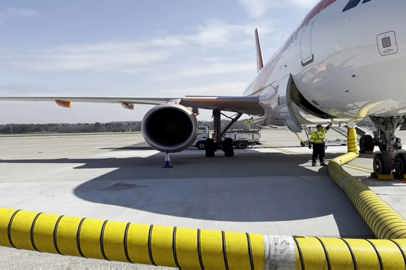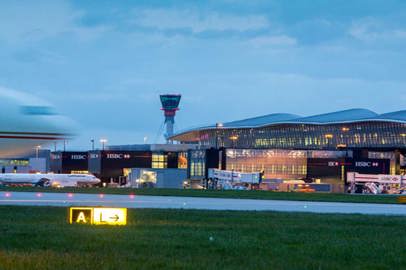31 January 2025
Vinci Airports accelerates on sustainability
Partnership with H2V and Hy2gen to develop e-SAF, sustainable synthetic fuels, at French airports by 2030
VINCI Airports, the world's leading private airport operator , manages the development and operation of more than 70 airports located in 14 countries (Africa,
Asia Pacific, Europe, North America, and South America). The company has signed a strategic agreement with H2V and Hy2gen to study and implement a sustainable synthetic fuels (e-SAF) production and supply chain for commercial aviation. By 2030, these low-emission fuels will be distributed at Lyon-Saint Exupéry, Lyon Bron and Clermont-Ferrand Auvergne airports, with a possible future extension to the Alpine airports of Grenoble, Annecy and Chambéry.
Asia Pacific, Europe, North America, and South America). The company has signed a strategic agreement with H2V and Hy2gen to study and implement a sustainable synthetic fuels (e-SAF) production and supply chain for commercial aviation. By 2030, these low-emission fuels will be distributed at Lyon-Saint Exupéry, Lyon Bron and Clermont-Ferrand Auvergne airports, with a possible future extension to the Alpine airports of Grenoble, Annecy and Chambéry.
The e-SAFs will be produced in Fos-sur-Mer by the consortium formed by H2V and Hy2gen, using low-carbon hydrogen. This type of fuel allows to reduce greenhouse gas emissions by up to 86% compared to traditional kerosene, without the need for modifications to airport facilities or aircraft engines.
The initiative is part of VINCI Airports ' environmental strategy for the decarbonisation of air transport, which since 2016 has been promoting the use of sustainable fuels (SAF) and aims for net zero emissions for its direct operations (scope 1 and 2) by 2030 in the EU, London (Gatwick) and Edinburgh.
Anticipating the European ReFuelEU Aviation regulation, VINCI Airports has been a pioneer in the distribution of SAF in France and Europe since 2021 and already offers this fuel in airports such as Toulon, Saint-Nazaire, Clermont-Ferrand and Budapest, with the imminent introduction also in Annecy.
VINCI Airports' initiatives for the decarbonization of the sector include:
- Modulation of landing fees: Airlines using SAF benefit from economic incentives.
- Reduction of airport emissions: electrification of service vehicles, use of renewable energy, APU-off solutions to limit the use of auxiliary generators.
- Promotion of sustainable transport: incentive for the use of public transport and electric cars, with over 700 charging stations already operational.
- Passenger awareness: initiatives to promote responsible behaviour, such as voluntary contributions to reforestation projects.
- Investments in hydrogen: participation in the Clean Hydrogen Infrastructure Fund, in collaboration with TotalEnergies and Air Liquide, to develop hydrogen-related infrastructure in the airport sector.
Edited by the editorial staff, Avion Tourism Magazine
Text source: Vinci Airport Press
Visual Photo: Copyright © Sisterscom.com / SonnyVermeer91/ Depositphotos
Lion Photo: Copyright © Sisterscom.com / Shutterstock
Things to see in Lyon
You might be interested in
Sustainability

Sustainable Mobility
Emirates accelerates on the green transition
From 2026, the airline, in partnership with Moro Hub, will move its data center to the Mohammad Bin Rashid Al Maktoum Solar Park, the world's largest solar-powered data center
Sustainability

Sustainable Mobility
easyJet adopts Apu-Zero project at Malpensa
Following successful pilot operations at the airport, the airline aims to reduce fuel consumption, CO₂ emissions and noise emissions
Sustainability

Sustainable Mobility
Heathrow accelerates towards net zero
London airport records a record February and reinforces its commitment to sustainability




